7 Skydiving Health Risks You Should Know About
Skydiving Safety
Posted by: Wisconsin Skydiving Center 2 years ago
Because skydiving is a niche sport, the general population tends to know little about skydiving health risks. Of course, there is always the looming fear focused on the off chance that the parachute may fail or malfunction on a jump. (A risk, we might add, that is neatly mitigated by the fact that every parachuting rig includes both a main and a reserve parachute.) Aside from this misguided fear, the skydiving health risks that you should actually consider are not widely known.
Skydiving is a sport, and as such, there are certain health considerations that should be made before scheduling a jump. Please note, our advice is no substitute for that of a trained physician – and for specific medical questions, you should always consult with your doctor. That being said, we are active skydivers with ample industry experience and so we feel confident covering the more common skydiving health risks. We have also taken many individuals with disabilities skydiving. If you anticipate needing an accommodation in order to make your skydiving dream come true, please reach out. We are here to support every body interested in skydiving!
Let’s get into it!
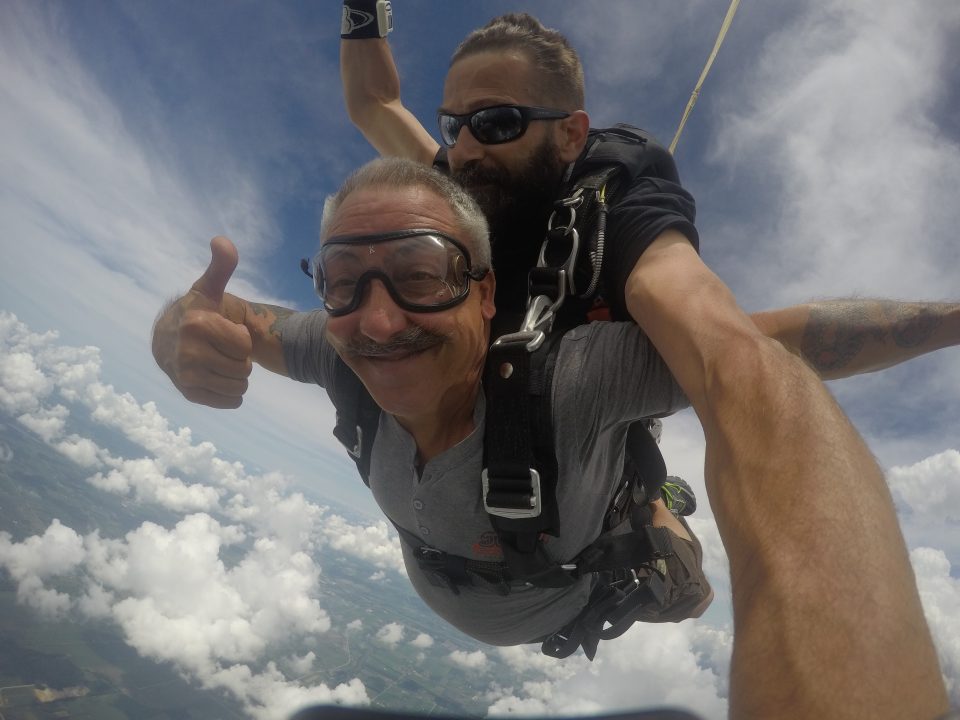
Seven Skydiving Health Risks
1. Hypertension or High Blood Pressure
Skydiving is an activity that will really get your blood pumping. On a skydive, the body is flooded with adrenaline. One of the body’s responses to the increase in adrenaline is an increased heart rate and, likewise, an increase in blood flow. For someone already diagnosed with hypertension, diagnosed with cardiovascular disease, or with an irregular heartbeat, skydiving can put undue stress on the heart. If you have one of these conditions, it is wise to consult with your doctor before jumping.
2. Age and Bone Density
Age-related osteoporosis can affect an individual’s ability to jump. For these individuals, suffering an injury or experiencing a bone fracture is a skydiving health risk. However, there is no maximum age limit on jumping (only the minimum age requirement of 18), and most individuals are fully capable of jumping well into their golden years. As a matter of fact, at Wisconsin Skydiving Center, we’ve flown with jumpers well into their 90s!
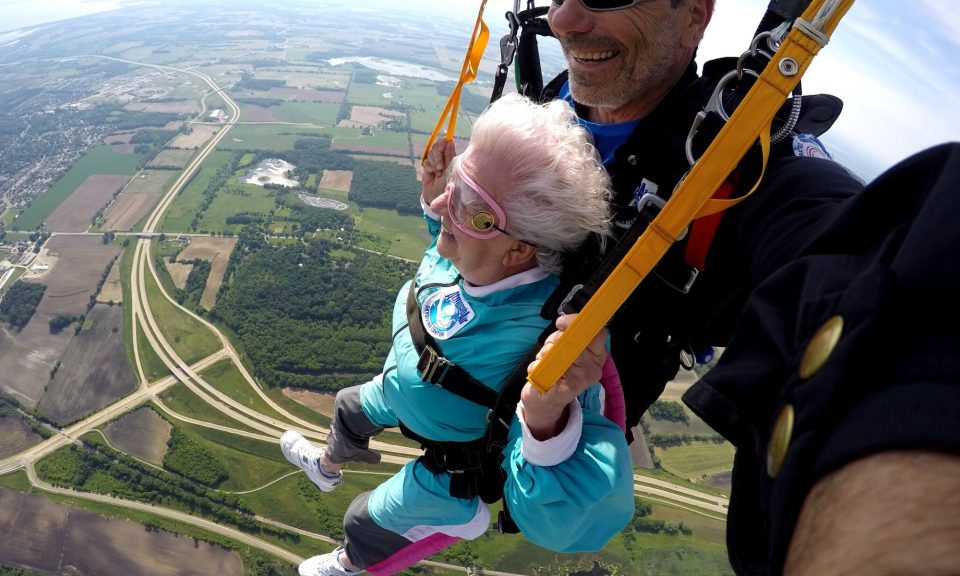
3. Mobility / Flexibility
A successful skydive requires that you have adequate range of motion and general mobility. In addition to climbing into the plane, at several pivotal points during the skydiving experience, you will be required to hold certain body positions. During exit and freefall, you will be asked to “arch” with your hips and pelvis pressing down and your shoulders held higher than your hips. By no means do you need to be a contortionist, but in order to properly assume this position, you will need to be relatively flexible. The arch body position is important because it is the way in which we ensure stability and increase the likelihood we will have an uneventful freefall and subsequent parachute deployment sequence.
4. Weight
In general, aviation is a critical dance between weight and balance, and the same applies to skydiving. There are only certain amounts of weight that skydiving gear can carry and that the skydiving instructor can physically bear. It is simply too risky to exceed these limits. If you are over the 260 lb weight limit at Wisconsin Skydiving Center, you will not be able to skydive. Safety first; always.
5. Diabetes
Being diagnosed with diabetes does not preclude you from skydiving. However, diabetes does present a potential skydiving health risk. Because unregulated insulin levels and/or high/low blood sugar can cause a loss of consciousness or even delirium, it is of the utmost importance that the condition is under control before you choose to make a jump.
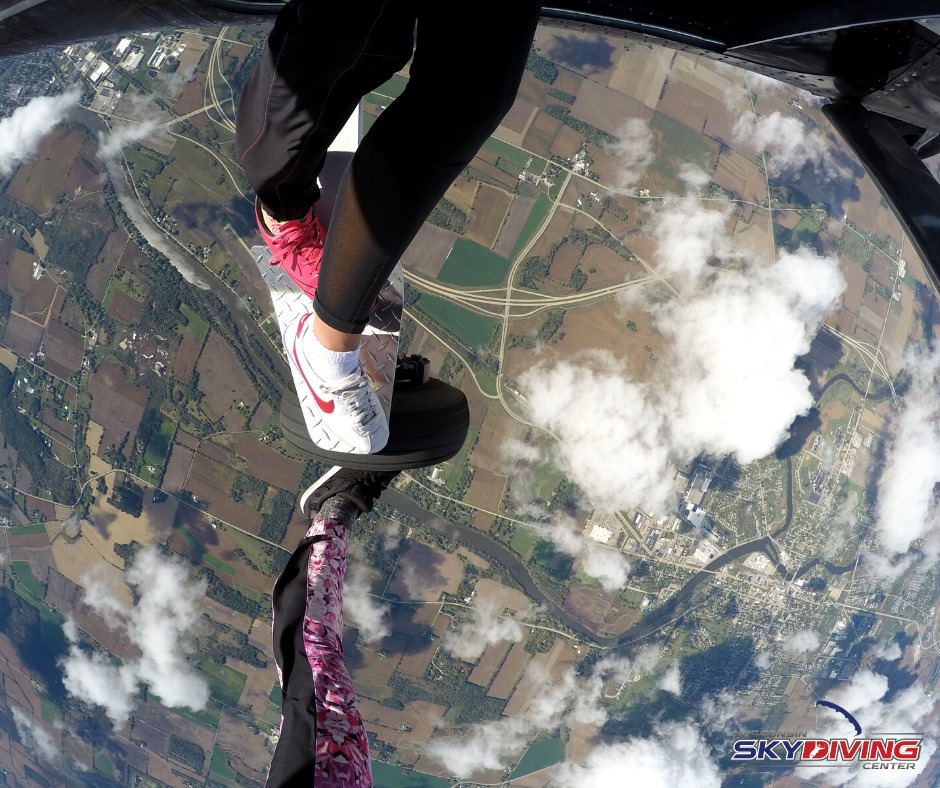
6. Knee & Ankle Injuries
Previous knee and ankle injuries present a skydiving health risk that should be mentioned to your instructor prior to jumping. For most landings, you will be asked to lift your legs. To avoid taking the impact in your lower extremities and joints, it is imperative that you heed their directions.
7. Back Problems
Those who suffer from back problems can still participate in skydiving. Though, like all of the skydiving health risks on our list, a physician should be consulted first. While it is unlikely that you will have any issues, if you have had spinal fusion or other back surgery, the consequences of a hard opening or hard landing could be disastrous.
General Skydiving Health Risk Questions
What is the Death Rate of Skydiving?
According to the United States Parachute Association, 2021 was the safest year in recorded skydiving history. Of the logged 3.57 million jumps made by skydivers at more 210 dropzones coast-to-coast, 10 resulted in a fatality – including zero student fatalities. In simpler terms, last year’s skydiving fatality rate for licensed skydivers was .28 fatalities per 100,000 jumps, meaning a .00028% chance of death. Fatalities associated with tandem skydiving have a 10-year average of one student fatality per 500,000 jumps.
Is Skydiving Good for Your Health?
Although there are some skydiving health risks, skydiving has numerous health benefits. From improving mental health to aiding with insomnia, there are many ways in which skydiving can be considered good for your health.
Is Skydiving Bad for Your Heart?
Although skydiving with certain heart conditions without a doctor’s approval is ill-advised, we want to express that skydiving, itself, is not bad for your heart. Typically, those who are healthy do not have to worry about skydiving causing any issues with the heart, and it is generally only those with pre-existing conditions who have cause for concern.
––––
Ready to seize the day (after getting your doc’s thumbs up)? Let’s go! Blue skies!
Categories:
You May Be Interested In:
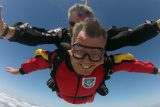
What’s a Skydiving AAD & Why It Matters
10 months ago by Wisconsin Skydiving Center

How Much Experience Do Skydiving Instructors Have?
11 months ago by Wisconsin Skydiving Center
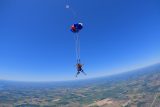
Do Skydivers Have Backup Parachutes?
1 year ago by Wisconsin Skydiving Center
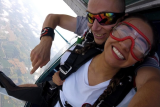
Is Skydiving Safe? Stats, Equipment & Your First Time
1 year ago by Wisconsin Skydiving Center